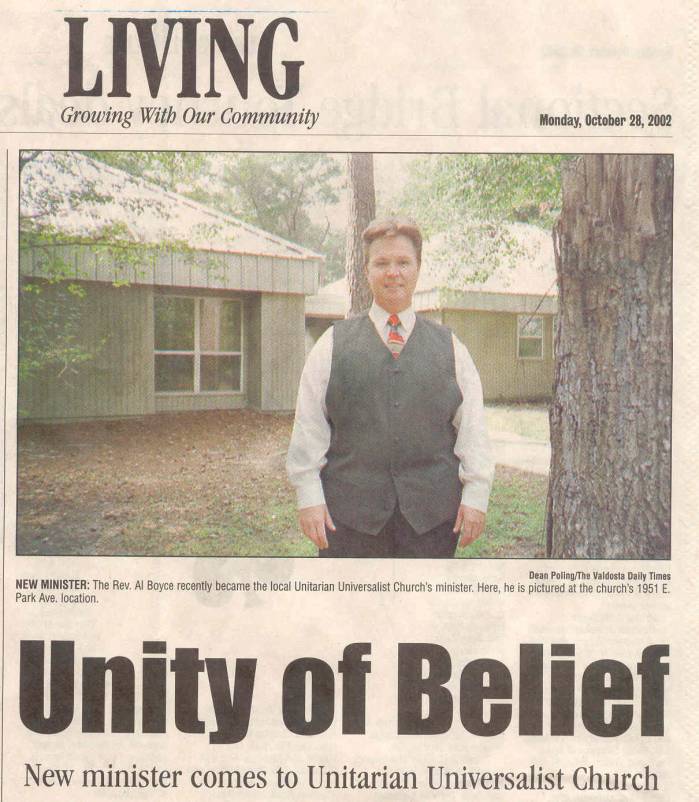|
|
|||||||
| "I hope we never forget that what we offer is an alternative religion not an alternative to religion. It is a religion shaped by the principles of freedom and open process: It is a liberal religion, but a religion nonetheless.” | |||||||
| - The Rev. AI Boyce, excepts taken from his opening sermon, "Glue," to the congregation of Unitarian Universalist Church, Valdosta. | |||||||
|
By
Dean Poling VALDOSTA The Rev. AI Boyce was not always of the Unitarian Universalist faith. He grew up with an old-school fundamentalist Protestant background and felt its calling. But in the mid-1970s, he left it all behind. "It did not feel authentic. I no longer believed in a personal God and it was extremely sad," he explains of leaving the faith of his youth. He returned to school to pursue other career choices and he recaIls a pivotal incident at a cocktail party during this period. "I said I would never stand behind a pulpit again and tell anyone what is correct and what is not correct about God, and someone said, 'Well, you may be interested in the Unitarian Universalist Church.'" The remark slowly opened a new door of faith to Boyce. He studied the church and its history and became a Unitarian minister. He has pastored at a New Jersey Unitarian Universalist Church which was part of the New York City metro area and recently he took a yearlong sabbatical at his home in Maine. A few weeks ago, he accepted a position as the pastor of the Unitarian Universalist Church in Valdosta, which reportedly marks the first time the church has had a full-time pastor who lives in the region. Nowadays, Boyce sees himself leaning toward becoming a Christian Unitarian, but he also sees himself in the role of a person seeking the divine from within and respecting each person's right to do the same in their own way.
Boyce
sees spirituality as seeking understanding and taking care of one's
body, spirit, and soul. For example, when he preached in Miami, Boyce
says he spent several days and nights living on the streets to better
understand the region's homeless population. And when his ministerial
duties lead to personal burn-out and spiritual fatigue, he believes
a minister should take a break to care for his or her own spirit as
he did when he took his sabbatical in Maine.
|
Boyce
shares a painful story of a teen-age girl who wanted an abortion.
She visited her Protestant preacher and the preacher told her abortion
was a sin and she should not do it. The girl did not get the abortion.
Instead, she committed suicide. Unitarian Universalists, Boyce says, have a deep commitment to social causes, social justice. They aim for moral and ethical responses to the world's problems and in finding one's own spiritual journey. "In a Unitarian service, someone can say I'm a pagan, I'm a Christian, I'm an atheist and here's why" Boyce says. Atheists, by the way are some of the most world's most caring people and have a deep sense of social conscience." As for the Unitarian Universalist Church, it has a long tradition in the U.S. and in several of the nation's social movements. Many of the Founding Fathers, such as Benjamin Franklin and Thomas Jefferson, were of a Unitarian bent. Transcendentalist thinkers, who often saw the divine in everything, such as Ralph Waldo Emerson and Henry David Thoreau, were Unitarian thinkers. Social movements such as women's rights, civil rights, the environment, gay/lesbian rights are supported by the U.U. Church.
Boyce
says U.U. congregations are often found in communities with college
campuses or concentrations of intellectual thought. On average of
two Sundays per month, Boyce will deliver the message; on other Sundays,
guests from the community and other locales are invited to
speak about a multitude of issues and topics.
|
||||||
